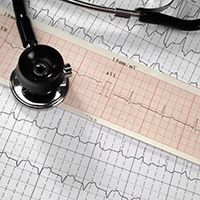Article
Testosterone Therapy Does Not Increase Risk of Heart Attack or Stroke in Men with Hypogonadism
Author(s):
Yet another large study has found that testosterone replacement therapy is more likely to reduce than increase the risk of major adverse cardiac events.

Yet another large study has found that testosterone replacement therapy is more likely to reduce than increase the risk of major adverse cardiac events.
The new analysis was undertaken by researchers at the Intermountain Medical Center Heart Institute in Murray, Utah and presented at the 2014 scientific sessions of the American Heart Association.
Those researchers followed 5,695 men, all of them Intermountain patients between the ages of 53 and 71, who presented with low testosterone levels on blood tests. After at least 3 years of follow-up, men with persistently low testosterone levels had significantly higher rates of heart attack, stroke and related death than men who successfully used replacement therapy to achieve either normal or even high levels of testosterone.
Roughly 14% of the men in the low-testosterone group had used replacement therapy but failed to raise their levels into normal range. The rest opted against treatment. All of the men in the “normal” and “high” testosterone groups used replacement therapy throughout the study period.
“Testosterone therapy has become very popular in the United States in recent years,” said Jeffrey Anderson, MD, a cardiologist at the Intermountain Medical Center Heart Institute, and lead researcher for the study. “With this study we are getting closer to defining the true associations between testosterone treatment and cardiovascular risks or benefits,” he said in a news release that accompanied presentation of the study results.
The new study is one of many to contradict a pair of much-publicized analyses that found significant associations between testosterone replacement and adverse cardiac events. The publication of those studies led public health advocates to demand the US Food and Drug Administration (FDA) review the safety data.
Almost immediately after they appeared, however, a steady stream of additional research began to undermine them, either by finding that testosterone replacement was not associated with any change to cardiovascular health or by finding that treatment was associated with fewer heart attacks and strokes.
The largest of these was an analysis of records from 25,420 Medicare beneficiaries, an analysis that found testosterone replacement to be associated with fewer myocardial infarctions (MIs) among men with the highest risk of heart disease and no significant change in MIs among other men.
The most dramatic study to associate testosterone replacement with fewer adverse cardiac events compared outcomes for 19,968 men who received therapy with general population data and found that men who received treatment faced far less than half the risk of either MI or stroke.
No other study has found any suggestion that testosterone therapy has such dramatic health benefits, but several others have found smaller, but still significant, positive associations between hormone replacement and heart health.
That said, the FDA’s review did not find enough evidence to credibly tie testosterone replacement to any change, in either direction, in the risk of heart attack or stroke, so a pair of the agency’s advisory panels asked agency officials to force companies that sell testosterone to undertake definitive studies.
Anderson, the lead author of the new study, also supports further studies but says his team’s work provides doctors with significant reason to believe that testosterone replacement is more likely to prevent than induce MI or stroke in hypogonadal men.
“While this study provides reassurance about the safety of using supplementation to move from low to normal levels of testosterone, more studies, particularly large randomized studies, are needed,” Anderson said.




